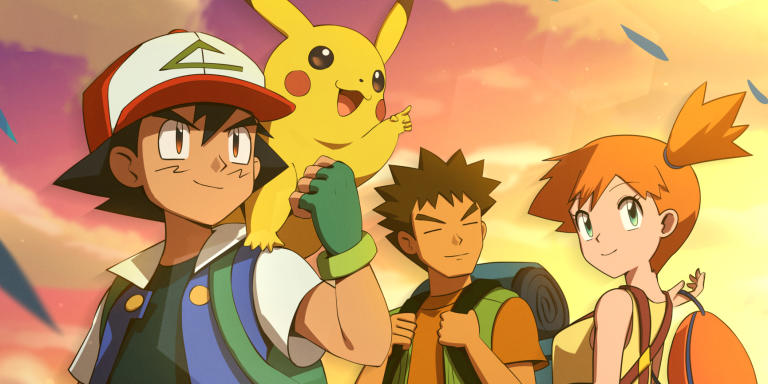

Pokemon, short for Pocket Monsters, began as a video game in 1996 for the Nintendo Game Boy. Developed by Game Freak and published by Nintendo, the game became an instant hit in Japan and eventually spread to the rest of the world, evolving into a global phenomenon.
The game’s concept was simple yet innovative. Players took on the role of a young trainer who sets out on a journey to catch and train Pokemon, which are creatures with unique abilities. The trainer then battles other trainers to become the best in the world. The game’s success paved the way for a host of sequels, spin-offs, and adaptations, including television shows, movies, trading cards, and toys.
The Pokemon franchise has evolved significantly since its inception, with each iteration bringing new Pokemon, regions, and gameplay mechanics. The second generation of games, Pokemon Gold and Silver, introduced 100 new Pokemon, a day and night cycle, and breeding mechanics. The third generation, Ruby and Sapphire, added double battles, weather effects, and the ability to customize the player’s base. The fourth generation, Diamond and Pearl, introduced online play and the ability to trade Pokemon with players from around the world. The fifth generation, Black and White, introduced animated battle sprites, a new region, and a story that explored themes of truth and idealism.
With each new generation, the franchise expanded its reach, attracting new fans and retaining old ones. The games became more complex, challenging, and engaging, and the world of Pokemon grew richer and more immersive. The franchise’s success was not limited to the games, however. The Pokemon anime, which premiered in 1997, became a cultural phenomenon in its own right. The show followed the adventures of Ash Ketchum, a young Pokemon trainer, and his friends as they explored different regions, battled gym leaders, and foiled the plans of evil organizations.
The anime introduced a host of iconic characters, including Pikachu, Ash’s loyal and powerful electric-type Pokemon, and Team Rocket, a bumbling trio of villains who were more comical than threatening. The show’s popularity led to a series of movies, which were released annually and featured epic battles, heartwarming moments, and unforgettable music. The anime also spawned a merchandise empire, with everything from plush toys to lunch boxes featuring the show’s characters.
The Pokemon trading card game, which debuted in 1998, was another success story. The game allowed players to collect and trade cards featuring their favorite Pokemon, battle other players, and compete in tournaments. The cards themselves were works of art, with detailed illustrations and intricate design elements. The trading card game helped to solidify the franchise’s place in popular culture, and it remains popular to this day.
The Pokemon franchise has also made its mark on the world of fashion. Collaborations with high-end brands such as BAPE, Uniqlo, and Coach have resulted in limited-edition collections featuring Pokemon-inspired designs. The franchise has also inspired countless fan-made clothing and accessories, from t-shirts and hoodies to sneakers and jewelry.
Perhaps the most significant evolution of the franchise, however, has been its impact on the gaming industry as a whole. The Pokemon games pioneered the concept of catching and training creatures, which has since been adapted by countless other games, such as Yo-Kai Watch, Digimon, and Dragon Quest Monsters. The franchise’s focus on exploration, discovery, and strategy has also influenced other games, such as The Legend of Zelda, Final Fantasy, and Fire Emblem.
The franchise’s impact is not limited to the gaming industry, however. The Pokemon Go app, which was released in 2016, became a cultural phenomenon, blending the real world with the world of Pokemon. The app used augmented reality technology to allow players to catch Pokemon in real-world locations, such as parks, stores, and landmarks. The app was an instant hit, with millions of players around the world venturing outside to catch Pokemon and socialize with other players.
The app’s success sparked a renewed interest in the franchise, with many players revisiting the games, the anime, and the trading card game. The app also led to a surge in tourism, with players flocking to famous landmarks and cities to catch rare Pokemon. The app’s impact on popular culture was significant, with celebrities, politicians, and businesses all getting in on the craze.
The Pokemon franchise has come a long way since its humble beginnings as a video game. It has become a global phenomenon, inspiring countless fans around the world and leaving an indelible mark on popular culture. Its impact on the gaming industry, fashion, and technology is undeniable, and its legacy is sure to endure for generations to come.
In conclusion, the evolution of Pokemon from a game to a global phenomenon has been a remarkable journey. From its inception as a video game to its impact on popular culture, the franchise has inspired countless fans and left an indelible mark on the world. Its focus on exploration, discovery, and strategy has influenced countless other games, and its impact on fashion and technology is undeniable. The franchise’s legacy is sure to endure for generations to come, and its continued evolution is something that fans around the world eagerly anticipate.
Follow OtakuAni on Facebook and Twitter for more updates on TV Shows, Dragon Ball Super, Anime, Movies, Games, and all Geek culture.
Cartoons are an integral part of most children's lives. From Tom and Jerry to Dora…
Bleach is one of the most popular anime series of all time. It has captured…
Manga is a form of Japanese comic book art that has become increasingly popular in…
Anime has become one of the most popular forms of entertainment worldwide. It has a…
Blue Lock is a popular anime series that has taken the world by storm. The…
My Hero Academia is a popular Japanese manga and anime series that has captured the…